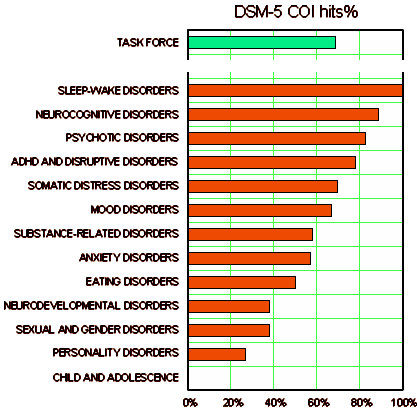PLoS Medicine
by Lisa Cosgrove and Sheldon Krimsky
March 13, 2012
Summary Points
These changes would accommodate the participation of needed experts as well as provide more stringent safeguards to protect the revision process from either the reality of or the perception of undue industry influence.

I re-sorted their DSM-5 Workgroup data to illustrate this point from their article:
Three-fourths of the work groups … continue to have a majority of their members with financial ties to the pharmaceutical industry. It is also noteworthy that, as with the DSM-IV, the most conflicted panels are those for which pharmacological treatment is the first-line intervention. For example, 67% (N = 12) of the panel for Mood Disorders, 83% (N = 12) of the panel for Psychotic Disorders, and 100% (N = 7) of the Sleep/Wake Disorders (which now includes “Restless Leg Syndrome”) have ties to the pharmaceutical companies that manufacture the medications used to treat these disorders or to companies that service the pharmaceutical industry.
Pharmalot has a good summary. It includes this statement:
In a statement, APA medical director and ceo James Scully says the DSM-5 development process “is the most open and transparent of any previous edition of the DSM. “We wanted to include a wide variety of scientists and researchers with a range of expertise and viewpoints in the DSM-5 process. Excluding everyone with direct or indirect funding from the industry would unreasonably limit the participation of leading mental health experts in the DSM-5 development process.”
I wonder how many times Scully, Kupfer, and Regier think they can say things like this without creating a global boycott of their beloved DSM-5? That graph up there is absurd. And his comment "Excluding everyone with direct or indirect funding from the industry would unreasonably limit the participation of leading mental health experts in the DSM-5 development process" is exactly the point everyone is making over and over. Reminds me of that wonderful movie title – The Gods Must Be Crazy…
Mickey, you’ll probably hear from the APA, too, but hours after I published a recent post on my blog about DSM-5 I received this email from the APA Communications Office:
http://www.scribd.com/doc/85601147/APAresponse031512
Basically, it contains APA President John Oldham’s rejection of Cosgrove & Krimsky’s conclusion, and his “strong” statement that 72% of the DSM-5 task force and work group members report NO relationships with the pharmaceutical industry during the past year.
To quote the kids today: “just sayin’.”